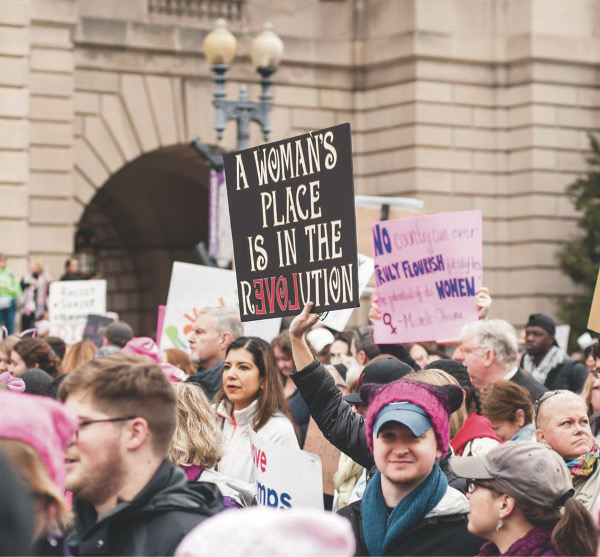
PHOTO/BRETT JELINEK, OLAFIMAGES.COM
Women’s History Month finds women vowing to be a tour de force at the polls this year.
When Donald Trump won the election in 2016, Teresa Shook of Hawaii (retired and a first-time activist) shared a Facebook post with a few friends, inviting them to march on Washington. The request exploded into an international phenomenon and led to the gigantic Women’s March of Jan. 21, 2017. When asked what drove her, Shook responded, “Something happened in me with this administration that woke up my love for people and humanity. …”
The Women’s Marches in 2017 and 2018 were among the largest demonstrations on record. The issues of a woman’s right to choose; the #MeToo movement exposing sexual assault and harassment; and the fight for equal pay were on full display. The call for the marches created a perfect storm of resistance to the dismantling of health care; the inhumane assault on undocumented populations, including the DACA “Dreamers”; the Muslim ban; the failure to denounce white supremacists, while giving aid and comfort to senseless killings by the police; the government’s failure to address the environmental crisis that is killing people and decimating Mother Earth, and instead doing the bidding of corporate interests; the gouging of the public treasury by the same corporate interests threatening Medicare, Medicaid, and Social Security.
Women are taking these causes to the polls. A former Navy pilot from Kentucky is running for Congress to save health care. A member of the Green Party is running for governor in Michigan to bring resolution to the Flint water crisis. A coal miner’s daughter in West Virginia is running for the U.S. Senate to bring environmental justice to her state. In Alabama, the African American women, in particular, were the driving force that won a Senate seat against the morally challenged Roy Moore—something unthinkable just weeks before. There are thousands more women running in local races around the country.
All this is a reflection both of the historical oppression of women—the oldest form of oppression—and the new economic situation faced by women. Women constitute the numerical majority in the United States. They are also a majority among low-wage workers—at a time when the economic foundation of society has been altered irrevocably. The destruction of the old industrial economy, the decimation of social programs, and the open rule by a tiny corporate class of billionaires has thrust women into the forefront of the struggle for economic survival being waged by all workers. We are witnessing the emergence of a profound new social movement that is being led by women. It is morally based and humanitarian-based. It defies “politics as usual.”
Today’s far-reaching social movement includes street protests and electoral campaigns, candidates running as independents and those running inside the old parties’ electoral structures. While the establishment parties are scrambling to channel the movement in their direction, the impulse for the motion comes from the grassroots. Many women running for office are doing so to highlight the issues of society, not to express blind or eternal loyalty to one party. They stepped forward on their own. And there is no turning back.
Today, the fight of millions of women—and men—for the basic necessities of life and for a humane society can only culminate in the ending of rule by the 1 percent. Today, a women’s place is in this revolution.


Let all of us women rise up and march with Parkland survivors for an end to gun violence! #BanAssaultWeapons
Men could come, too. It’s all of us that shall overcome the killings.